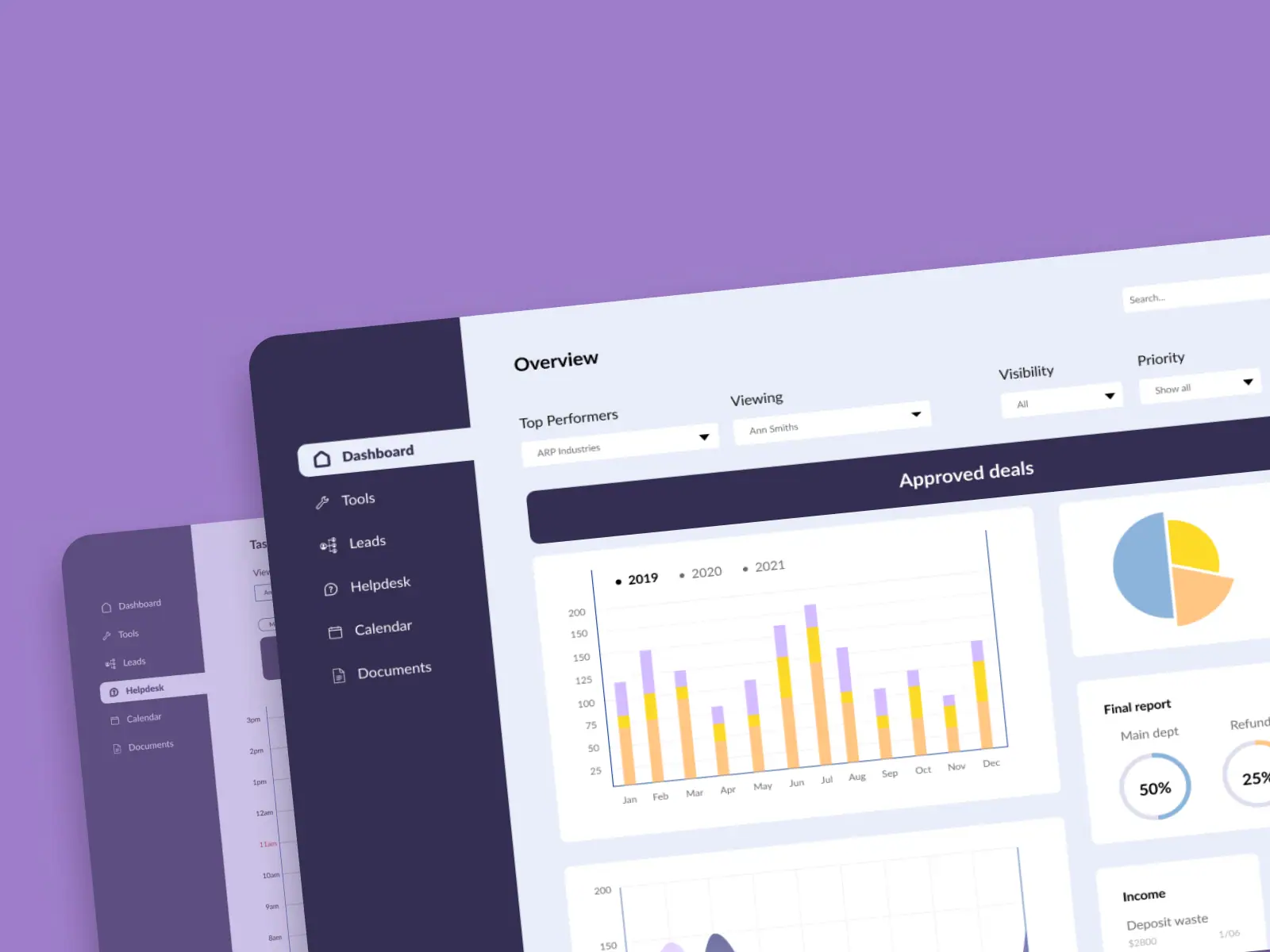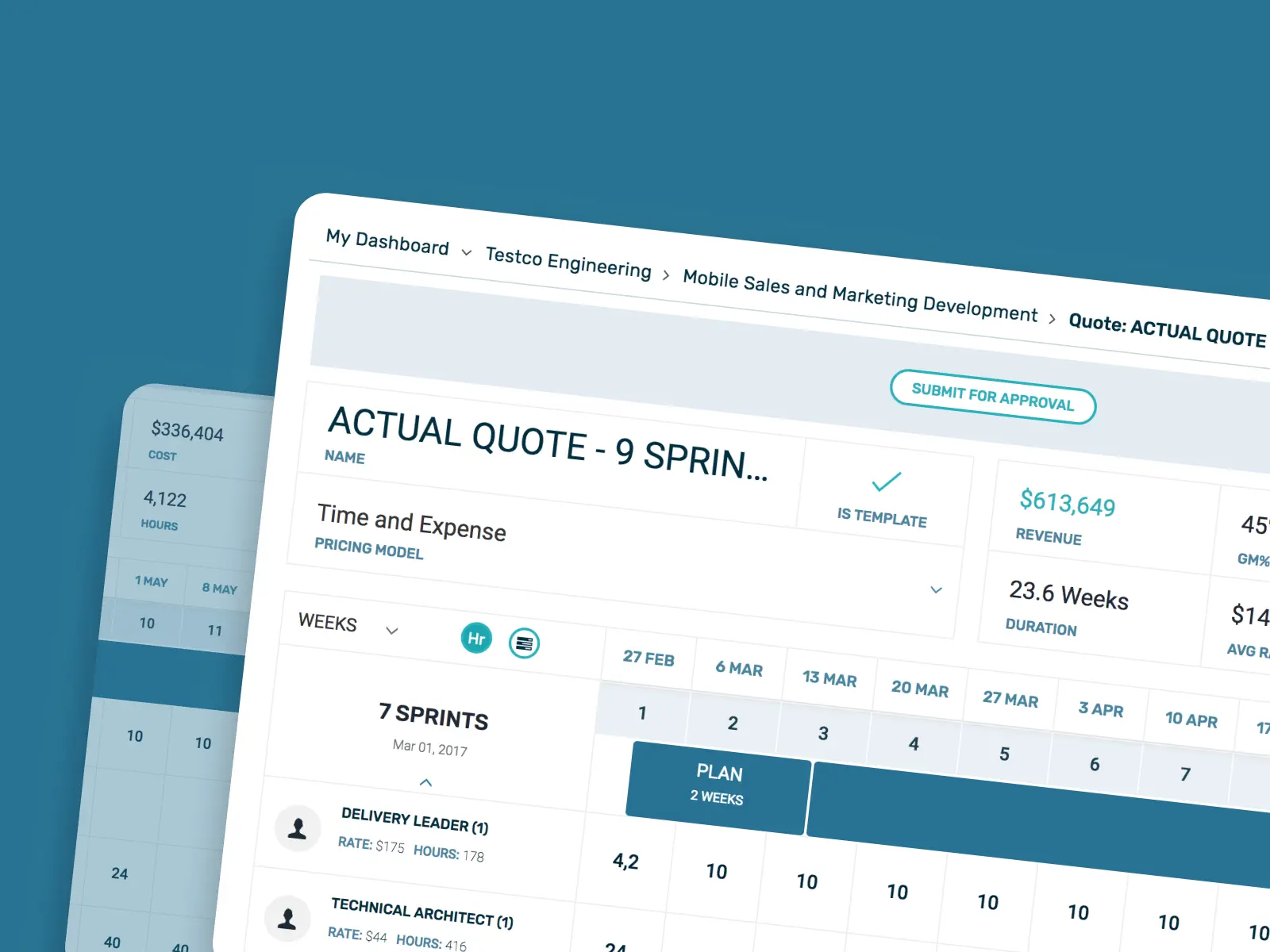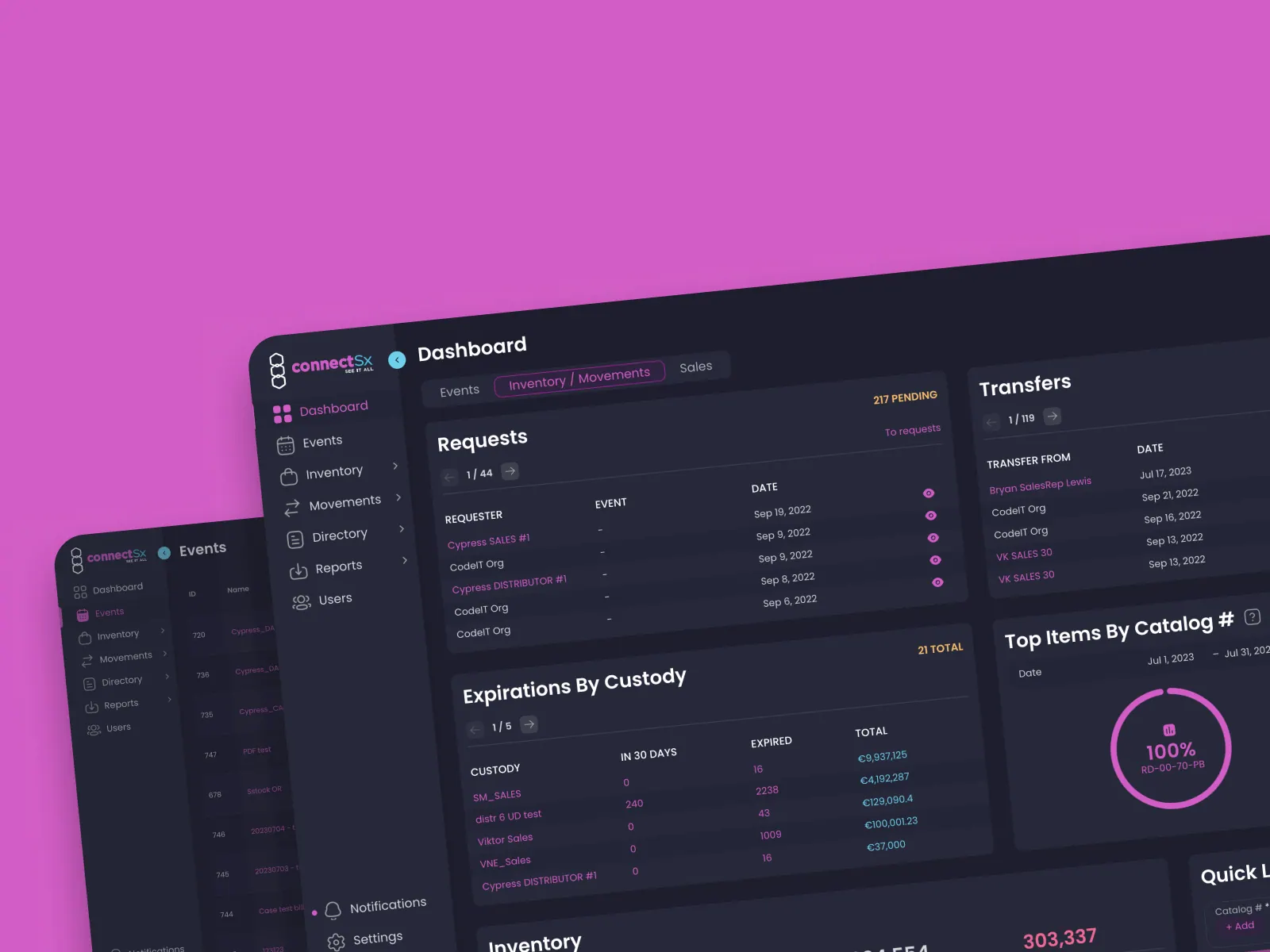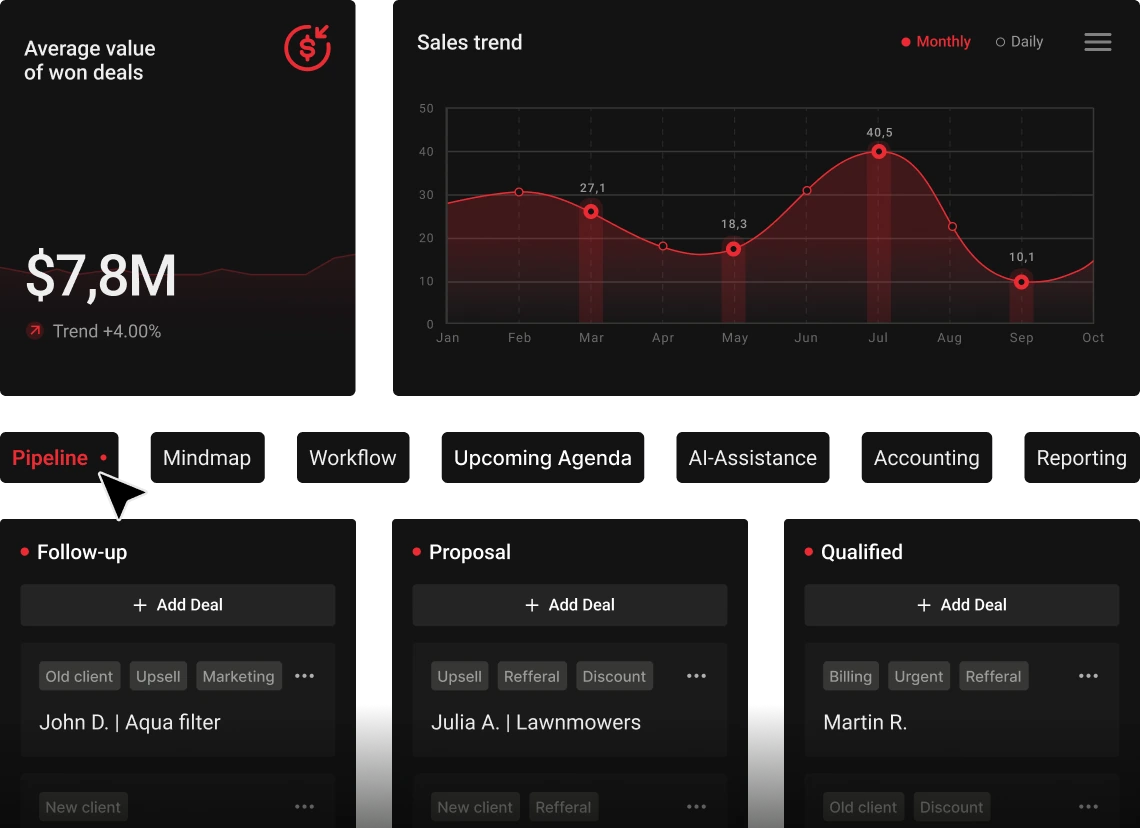CRM Integration and Configuration
18+ years building CRM systems for Healthcare, FinTech, Logistics, and more — engineered around your business logic. With ISO27001-certified processes, we deliver custom enterprise-grade solutions with full control, deep integrations, and measurable ROI.

Business First
Code Next
Let’s talk
- Lead management
- Sales forecasting
- Contact management
- Task management
- Mobile-friendly and accessibility-first design
- Knowledge base
- Ticketing system
- Sales management
- Customer feedback management
- Marketing analytics
- Campaign management
Custom CRM software development services
Automate repetitive tasks, streamline lead management, and boost sales pipeline visibility with our services. Seamlessly integrate your custom CRM with existing systems to create a unified platform for all your business data.
Automate repetitive tasks, streamline lead management, and boost sales pipeline visibility with our services. Seamlessly integrate your custom CRM with existing systems to create a unified platform for all your business data.
Custom CRM development
Build custom CRMs for any industry with Industry-specific features & seamless platform integration. Ensure it perfectly fits all your business needs with no compromises.
Cloud CRM
Build your CRM scalable and secure by deploying it in a cloud-based server. Make the system’s functionality available 24/7 from any location.
CRM customization
Boost customer experience, automate tasks, and unify channels for upselling success by adjusting the existing CRM or enhancing its functionality with new features.
Mobile CRM development
Make the functionality of your CRM software available on the go with custom mobile solutions to enhance the productivity of your team.
CRM modules
Design and deploy custom modules for task and KPI tracking, real-time data analysis, reporting, and lead generation, laying the foundation for business growth.
CRM analytics
Empower your business with custom CRM analytics from our experts, featuring predictive modeling and integrations with phone, email, chat, and social media for efficient segmentation.
CRM integration
Integrate a CRM system with your existing software, creating an all-in-one customer view to enhance sales forecasting, task tracking, and data visibility for your business.
CRM maintenance
Troubleshoot unforeseen technical issues and ensure your CRM is running smoothly and optimized and no errors occur.
CRM migration
Seamlessly transfer your CRM data to a new system and get a new CRM configured as per your business needs and workflows.
CRM automation
Identify and eliminate tedious tasks in workers’ workflows by developing, implementing, and configuring CRM automation tools.
CRM security
Implement security measures to safeguard your data. Ensure complete adherence to industry standards and regulations.
CRM optimization
Optimize data flow and storage operations to ensure your CRM system operates at peak performance.
Real-world results of custom CRM development company
Explore real challenges solved. Dive into how we delivered custom ERP solutions that transformed operations.

CRM with payment processing
A Secure, Scalable CRM Engine Built for High-Volume Payment Operations
The US-market-focused CRM solution unified the client’s lead and merchant-processing workflows, delivering a secure, scalable system ready for sustained high-volume growth.
- 250,000+ Active merchants
- 40m+ Monthly transactions
- $3.5b+ Monthly sales volume

Zimit, Workday company
Resource planning and CPQ software
The US-based resource planning and CPQ system transformed the client’s professional-services operations from manual and fragmented to automated, transparent and scalable.
- 90%+ Automation of paperwork workflows
- CRM/PSA data synchronisation
- Dashboard & PWA integration
- Scheduling and forecasting
- Human resource management

Connect Sx
Inventory management for hospitals
The US-based medical inventory management solution modernised the client’s surgical-device workflows, establishing a secure, scalable foundation for inventory control and compliance.
- Web-based application
- Mobile application
- UDI scanning mobile app

Roomster
An Airbnb-like platform that delivers functionality for finding roommates.
The solution strengthened the client’s position as the biggest roommate finder platform in the USA, delivering a high-performance, scalable ecosystem that supports millions of users and global listing growth.
- 5+ Million active listings
- 142 Countries
- 3+ Million active users
Unlock competitive advantage with a custom CRM

Business First
Code Next
Let’s talk
Building lasting partnerships
With 18+ years of experience, we’ve tackled over 500+ challenges, earning our clients’ trust.
Benefits of custom CRM software
Avoid bloated features, sky-high subscription costs, and workarounds. A custom CRM adapts to your business logic, not the other way around.
Complete your business with the following benefits.
Avoid bloated features, sky-high subscription costs, and workarounds. A custom CRM adapts to your business logic, not the other way around.
Complete your business with the following benefits.
Internal processes optimization
Boost team efficiency with automated workflows and task assignments, freeing up time for higher-value activities.
Reduction of operational costs
Automate routine tasks, eliminate redundancies, and optimize resource allocation with tailor-made CRM software.
Efficient lead management
Maximize the value of your leads and accelerate sales cycles by centralizing lead data, automating lead scoring, and automating follow-ups.
Improved data security
Enable data encryption and access controls to regular audits and compliance monitoring to ensure that your customers’ data remains protected.
Detailed analysis and reports
Make data-driven decisions by using custom reports that help uncover trends and identify opportunities.
Sales and marketing optimization
Identify and test new sales opportunities at every stage of the customer journey, driving higher conversion rates and revenue growth.
Streamlined communication
Improve internal and external communication channels by centralizing data and facilitating collaboration across departments.
Improved system scalability
Easily scale your CRM solution to accommodate business growth and evolving needs without disruptions or downtime.
Real-time collaboration
Facilitate real-time collaboration among team members, enabling better coordination on projects and tasks.
Regulatory compliance
Ensure compliance with industry regulations and data protection laws by implementing robust security measures and data governance protocols.
Customized dashboards
Create custom dashboards that provide relevant insights and KPIs for different teams and stakeholders, improving decision-making across your organization.
Integration flexibility
Seamlessly integrate your CRM with other business systems and third-party applications to increase efficiency and accuracy.
Custom CRM for any industry—built on experience
CodeIT provides custom CRM development services to businesses in various industries to solutions that meet their specific needs and goals.
Manufacturing
Optimize your manufacturing processes with our custom CRM solutions. Improve efficiency and reduce costs in the manufacturing industry.
- Inventory tracking and management
- Production scheduling and monitoring
- Supply chain logistics optimization
- Automated reordering and procurement
- Quality control management
Logistics
Gain real-time visibility into your logistics processes and manage operations. Track shipments across multiple locations, manage carriers, and optimize delivery routes.
- Multi-location shipment tracking
- Carrier management
- Delivery route optimization
- Business process automation
- Collaborative tools for carriers
Healthcare
Enhance patient care and compliance. Get a CRM that supports medical professionals in delivering quality care and maintaining patient data confidentiality.
- Patient scheduling and appointment reminders
- Electronic health record (EHR) management
- Telemedicine integrations
- Regulatory compliance tracking
E-learning
Unlock the full potential of your e-learning platform with a custom CRM designed to meet the unique needs of the e-learning industry.
- Personalized student management
- Automated communication
- Course management
- Reporting and analytics
Fintech
Transform your financial services by delivering personalized financial solutions and driving customer engagement in a highly regulated environment.
- Customer onboarding
- Transaction tracking and monitoring
- Automated risk assessment
- Portfolio management
E-commerce
Boost sales and customer loyalty by enabling e-commerce companies to engage customers at every touchpoint and drive revenue.
- Customer segmentation and targeted marketing
- Order management and fulfillment tracking
- Post-purchase support and feedback management
- Integration with e-commerce platforms
- Loyalty program management
How our CRM software development company works
The development of custom-built CRM software comprises comprehensive business requirements analysis and iterative solutions delivery.
Discover how our CRM development company builds customer relationship management systems in stages.

Initial consultation
Discuss your business needs and problems to address.
This phase is designed to share your vision, outline your specific requirements, and discuss the obstacles you face. We identify the key features and functionalities for your CRM, making sure that it not only addresses your current needs but also positions your business for future success.
- First contact: reach out to our team, and we’ll respond within 24 business hours.
- Confidentiality assurance: sign a non-disclosure agreement (NDA) to keep your project details secure.
- Initial interview: share your business vision, technical requirements, CRM needs, specific features, etc.

Planning and analysis
Define the specific functionality of your CRM and create a step-by-step solution development plan.
During this stage, our team works closely with you to clearly define the specific functionality your CRM system will require to meet your operational goals. We focus on defining clear roles, establishing efficient communication channels, and selecting the most suitable technologies.
- Detailed analysis: thoroughly analyze CRM vision and technical requirements.
- Communication plan creation: define roles and prepare a communication agenda.
- Tech stack proposal: get the best custom CRM software development approach and choose the best-fitting technologies.
- Backlog creation: identify and prioritize tasks to complete.
- Wireframes development: analyze and map out the user journey.

CRM design
Create an intuitive and user-friendly UX/UI design for a customer relationship management system.
Our primary focus during this stage is to create a user-friendly interface that not only meets your business needs but also offers a seamless experience for your team and customers. You’ll have the opportunity to review, provide feedback, and validate the design to ensure it perfectly aligns with your expectations before moving forward.
- Requirement analysis: review business requirements and wireframes.
- UX/UI design: create user-friendly designs and establish brand identity.
- Review and validation: review the design with you and make necessary adjustments.

Iterative development and testing
Complete prioritized tasks and release the developed features iteratively.
Each development sprint is carefully planned, with a clear focus on delivering high-quality features that integrate seamlessly into your CRM solution. As features are developed and tested iteratively, you’ll have the opportunity to review them, ensuring that the system aligns with your evolving requirements and business goals.
- Sprint planning: compose user stories with the definition of done for each.
- Feature development: complete user stories by developing defined features.
- 3-rd party integration: conduct API development for CRM and integrate external services.
- Quality assurance: review the code and run unit, integration testing.

Data migration
Develop a data migration plan, validate datasets, and migrate all the records to the new system.
Move all historical and current data from your legacy systems into the new CRM in a way that preserves its integrity and usability. Data migration involves more than just moving records—it requires meticulous preparation, validation, and post-migration checks.
- Data assessment: analyze existing data to determine migration requirements.
- Data migration plan creation: compose a step-by-step plan for preparing and migrating all the records.
- Migration execution: transfer records to the new CRM system.
- Data validation: double-check migrated data to ensure no records are damaged or changed.

CRM deployment
Configure a cloud-based or on-premise server. Deploy a CRM system and conduct acceptance testing.
Whether you’ve chosen a cloud-based or on-premise solution, our team ensures that the server setup aligns with your technical and operational needs. We deploy your CRM system with minimal disruption to your business.
- Live server setup: configure a cloud or on-premise server per the system’s needs.
- CRM release: make the MVP live and incrementally release new features.
- User training: prepare user guides or conduct a workshop to train users on how to use the new CRM system.
Make first step to building your dream CRM

Business First
Code Next
Let’s talk
Features our custom CRM development company delivers
Equip your custom CRM with the tools your business needs to thrive. Manage your contacts, automate tasks, and gain insights that drive sales success.
Equip your custom CRM with the tools your business needs to thrive. Manage your contacts, automate tasks, and gain insights that drive sales success.
Equip your custom CRM with the tools your business needs to thrive. Manage your contacts, automate tasks, and gain insights that drive sales success.
Lead management
Meticulously track all the customer interactions through the sales pipeline, from initial contact to conversion. Analyze all the activities for further optimization.
Sales forecasting
Analyze historical data and current market trends to accurately predict future sales. Adjust your strategic plans and resource allocation as per seasonal trends or market changes.
Sales management
Oversee and track sales opportunities like upselling or cross-selling. Ensure your clients progress through the sales cycle with timely follow-ups and updates.
Contact management
Keep and manage all the customer data, including contact information, interaction history, or notes for personalized communication.
Analytics and reporting
Configure automatic report generation with custom data. Access analytics to monitor sales performance, identify trends, and make informed business decisions.
Task management
Schedule, assign, and track sales tasks and activities to ensure that all team members stay on top of their responsibilities and tackle their tasks effectively.
Case management
Receive, track, and manage customer requests to ensure maximum customer satisfaction and retention.
Knowledge base
Create a repository of articles and FAQs. Develop a tool for code-free creation of customer guides aimed to help find solutions quickly and effectively.
Ticketing system
Enable the opportunity to create and manage support tickets. Prioritize them and track their resolution status to streamline customer support processes.
Performance tracking
Monitor and evaluate support agent performance, helping identify training needs and improve service quality.
Live chat
Create the opportunity for customers to reach out to your business using a live chat. Create chatbots to process large amounts of requests automatically.
Customer feedback
Build and use tools for collecting and analyzing user feedback. Run surveys to gain insights into customer needs and improve service quality.
Campaign management
Create, run, and monitor marketing campaigns across multiple channels to coordinate efforts and track efficiency.
Email marketing
Develop email marketing campaigns and compose custom newsletters. Track customer retention and engagement.
Social media integration
Manage and track social media interactions, helping build brand presence and engage with customers using different platforms.
Lead scoring
Analyze the behavior of leads and their engagement to focus efforts on high-potential lead generation opportunities.
Marketing analytics
Analyze marketing activities to gain insights into the effectiveness of lead generation approaches to spend the budget wisely.
Form builder
Create and manage custom data collection forms for effective lead generation and capturing valuable customer information seamlessly.
FAQ
The time required to develop and release a custom CRM depends on the number and variety of features. At CodeIT, we use the iterative approach that enables the opportunity to launch your product fast and gradually enhance its functionality with new features.
We implement robust CRM security measures, including data encryption, access control, regular audits, and compliance monitoring. Our approach aligns with industry standards and regulations.
Yes, CRM systems can be integrated with third-party services to enhance functionality and create a unified platform.
CRM integration services allow seamless connectivity with other business tools, such as ERP systems, marketing automation platforms, and communication tools. These tools provide a comprehensive view of customer interactions and improve data visibility and operational efficiency.
The cost of a custom CRM varies depending on your required features, integration needs, and project scope. Feel free to contact us to receive a tailored estimate based on your business goals.
Customer relationship management (CRM) development services involve creating and customizing software that helps businesses manage their interactions with current and prospective customers.
These services include constructing custom CRM solutions tailored to specific industry needs, enhancing existing CRM systems, integrating CRM software with other business instruments, and providing ongoing support and maintenance to ensure the CRM system functions smoothly.
A custom CRM system is designed to meet the unique needs of a business by incorporating a range of core and advanced features. These features can be tailored to support specific business processes, enhance productivity, and improve customer relationships.
Here are the key features typically included in a custom CRM.
Basic features:
- Lead management
- Sales forecasting
- Opportunity management
- Contact management
- Task management
- Case management
- Knowledge base
- Ticketing system
- Campaign management
- Email marketing
- Form builder
Advanced features:
- Analytics and reporting
- Performance tracking
- Live chat
- Customer feedback
- Social media integration
- Lead scoring
- Marketing analytics
Yes, your existing CRM systems can be upgraded. The process involves:
- enhancing the functionality with new features
- customizing the interface to fit your business processes better
- integrating it with additional third-party services
- developing and integrating new modules
- optimizing performance
CRM customization and CRM optimization services ensure that the upgraded system aligns with your current and evolving business needs.
Yes, a CRM can be built with a specific feature set tailored to your business needs.
Our services focus on creating solutions that address your business’s unique requirements, whether it’s sales management, customer service, marketing automation, or any other specific functionality.
Tailor-made features help enable the organization’s strengths and competitive advantages.
Yes, CRM systems can be integrated with third-party services to enhance functionality and create a unified platform.
CRM integration services allow seamless connectivity with other business tools, such as ERP systems, marketing automation platforms, and communication tools. These tools provide a comprehensive view of customer interactions and improve data visibility and operational efficiency.
The development of a custom-made CRM system enables the opportunity to avoid the limitations of pre-built solutions used by industry competitors.
The top benefits of using a custom CRM are:
- Enhanced operational efficiency—automated workflows, optimized internal processes, and reduced operational costs.
- Tailored solutions—a CRM perfectly fits your business needs with no compromises.
- Improved data security—robust security measures help protect sensitive data.
- Enhanced lead management—-centralized lead data and automated follow-ups to maximize lead value.
- Detailed analysis and reporting—data-driven decisions with custom reports and analytics.
- Sales and marketing optimization—higher conversion rates and revenue growth through optimized sales and marketing funnels.
- Improved scalability—a CRM system is easy to scale to accommodate business growth.
- Optimized collaboration—improved internal and external communication and facilitated real-time collaboration.
- Regulatory compliance—compliance with industry regulations and data protection laws.
The CodeIT follows these steps when creating custom CRM solutions that address the specific needs and goals of your business.
- 1. Initial consultation. Discuss business needs, sign an NDA, and share your CRM vision and requirements when opting for CRM consulting services.
- 2. Planning and analysis. Define CRM functionality, create a development plan, and propose a tech stack.
- 3. CRM design. Create an intuitive UX/UI design and validate it with stakeholders.
- 4. Iterative development and testing. Develop and test features iteratively, integrate third-party services, and conduct quality assurance.
- 5. Data migration. Analyze existing data, create a migration plan, transfer records, and validate data.
- 6. CRM deployment. Configure the server, deploy the CRM system, and conduct acceptance testing.
7. User training. Prepare user guides or conduct workshops to train users on the new CRM system.

























